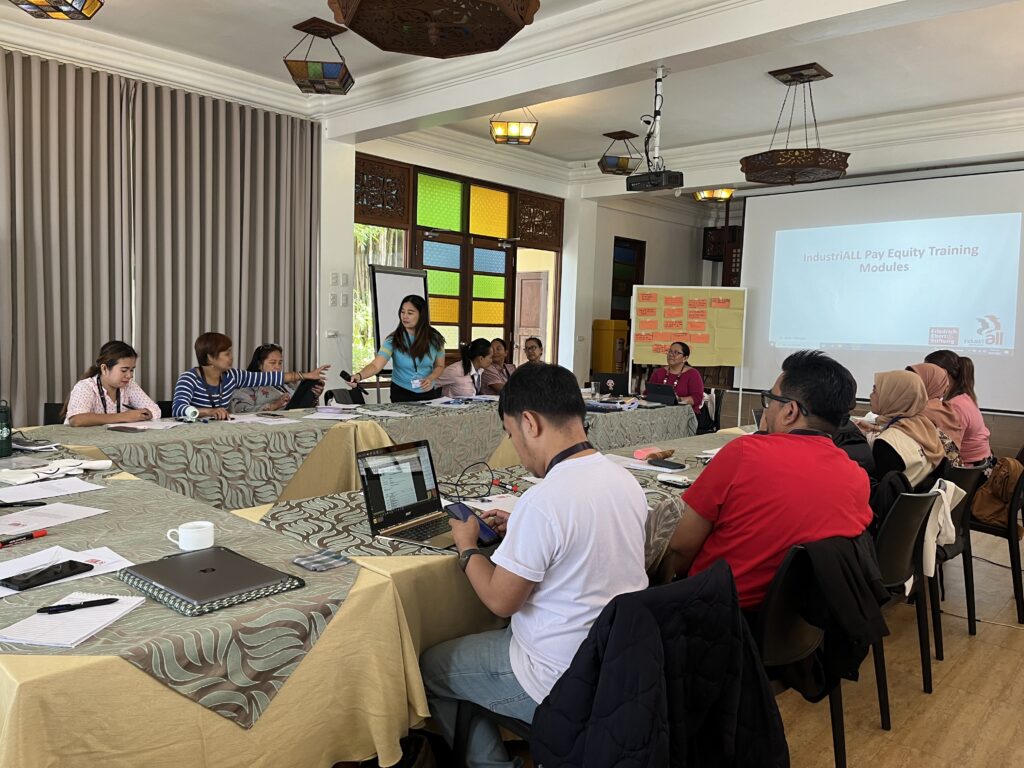22 July, 2025Twenty women and men trade union leaders from South East Asia made a clear commitment to take action to reduce the considerable gender pay gap in the region.
During the two-day training of trainers on pay equity, organized by IndustriALL and the Friedrich-Ebert-Stiftung (FES) on 10–11 July 2025 in the Philippines, selected union leaders, trainers and negotiators from Cambodia, Indonesia, Malaysia, the Philippines and Thailand shared the challenges they face in obtaining gender pay data and monitoring gender equity policies.
All the countries ratified ILO Convention 100 on Equal Remuneration and have national laws prohibiting discrimination based on gender or sex. Yet, only the Philippines has comprehensive national policies assessing pay equity such as gender equality and women's empowerment plan 2019-2025, gender and development indicators and gender-disaggregated data on wages and employment.
Cambodian unions rely on labour inspectorate to handle pay discrimination complaints; the absence of a dedicated labour court means lack of enforcement. While Indonesian labour law lacks anti-discrimination clause, authorities and companies are not obliged to provide wage data disaggregated by gender.
Malaysia's ministry of human resources-initiated programmes to narrow wage gaps; on average Malaysian women earned 17.8 per cent less than men for similar work. It is interesting to note that Thai women earn a higher average base wage than men, but their total income is still lower than men if bonuses are included. This phenomenon shows the bonus system is unequal and gender-biased.
Participants expressed their gratitude as they learned more about integrating the principles of gender pay including gender-neutral evaluation, carrying out a gender pay gap report, some language used in valuing jobs and the formula for computing gender pay equity.
Participants developed an action plan to close the gender pay gap in the region:
- Development of gender pay equity module and conduct national-level trainings
- raise awareness on gender pay equity through campaigns and mass leafletting
- organizing women committees-with focused group discussions on pay equity
- collection of gender-disaggregated wage data
- preparation of a gender pay analysis
- organizing pay equity training for CBA negotiators
- inclusion of pay equity proposals in CBA proposals
Philippine senator Risa Hontiveros, said:
“I always believe that policy should uplift the most vulnerable especially women workers in informal and precarious conditions. That belief has shaped my work in the senate and continues to guide our fight for inclusive, gender-responsive laws. Let’s work together so women workers are empowered, respected and paid what we truly deserve.”
IndustriALL South East Asia regional secretary, Ramon Certeza, said:
“Trade unions in South East Asia have a central role to play in closing the gender pay gap, key is organizing and activism, by pushing for equal pay, advocating inclusive collective bargaining and holding employers accountable to gender equality in the workplace. We aim and commit to work on that path and building the understanding and capacity of our affiliates in the region on the issue of gender pay gap is one bold step forward leading to that direction of achieving pay equity in every workplaces.”




